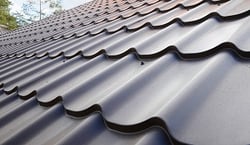
Metal roofing may seem outdated, but it has its share of positives. The longevity and the minimal maintenance make it ideal for many homeowners. Here are some of the key points to discuss with anyone interested in comparing roofing products so they can fully understand the options.
Pro: Metal roofs are made to last. In terms of longevity, you can expect your metal roof to hold up for at least 40 years. Some may even last up to 70 years. A standard asphalt roof, alternatively, usually only lasts 12 to 20 years.
Con: The expense of a metal roof is higher than asphalt and various other materials as well. For instance, metal shingles range from $7.00 to $10.00 per square foot, including the fee of installation. The average cost of a standing seam metal roof, on the other hand, costs an average of $9.00 to $12.00 per square foot. Asphalt shingles range from $30 to $50 for a bundle, which averages between $100 to $150 per square. In terms of a complete project, asphalt shingles for a 1,500-square-foot house will cost you at least $5,000, and the price could reach up to $8,000. A metal roof, however, may cost you $12,000 for the same size of house, possibly even more. Keep in mind though, with metal roofing you don't have to replace it as soon as you would asphalt shingles. It's initially more expensive but can save money in the long run.
Pro: Metal roofs are more energy efficient in the summer when compared to asphalt and many other types of roofing. They deflect the heat while most other types absorb it. In the colder months, a metal roof acts like insulation. On the contrary, asphalt shingles absorb the cold. You'll notice a difference in your energy bills if you switch from another material to metal because a metal roof is one of the most energy-efficient options you can select.
Con: A metal roof can be noisy during a hailstorm or heavy rain. While no roofing is 100-percent soundproof, metal roofing is the noisiest option during severe weather. Contrary to popular belief, however, it isn't noisier during a typical storm. It shields out the sound of rain rather well. If you fear metal roofing will be too loud for you, it's possible to enhance the soundproofing of your home by installing additional insulation. It adds to the expense of your installation but can increase the comfort of your home.
Pro: A metal roof is extremely durable. It'll hold up during strong winds of over 100 miles per hour. It doesn't crack as a result of the weather, and you don't have to worry about erosion over time, either.
Con: Installation tremendously impacts the quality of a metal roof. You must use high-quality fasteners that allow the material room to breathe, or you could find the large metal panels loosening. This occurs as a result of the roof panel expanding and contracting.
Pro: If you choose metal roofing, it requires very little maintenance. Asphalt shingles and other roofing materials need to be inspected at on a regular basis. With a metal roof, the upkeep is much less detailed. It usually just requires routine cleaning.
Con: It's more costly to repair a metal roofing shingle or panel than it is to replace asphalt shingles. Luckily there should be less need for repair or replacement due to the durability of metal.
When homeowners spend thousands of dollars on improvements for their home, it's vital to educate them on their options. The key points to cover when discussing roofing projects include the cost, the longevity and the maintenance needed. If they choose to go with a metal roof, you’ll want to use the SCRAIL® RoofLoc® Metal Roofing System from BECK America. The key is the fastener that drives in like a nail but has the holding power of a screw. They also back out like a screw, making adjustments quick and easy. They have 520-pound holding strength. Each fastener has a leak-proof EPDM-washer that resists temperature contraction due to temperature extremes; and no metal residue or “pig tails” allows for superior washer seal and eliminates scratches. Download the Nine Facts About Metal Roofs Whitepaper below.
.svg.png)

